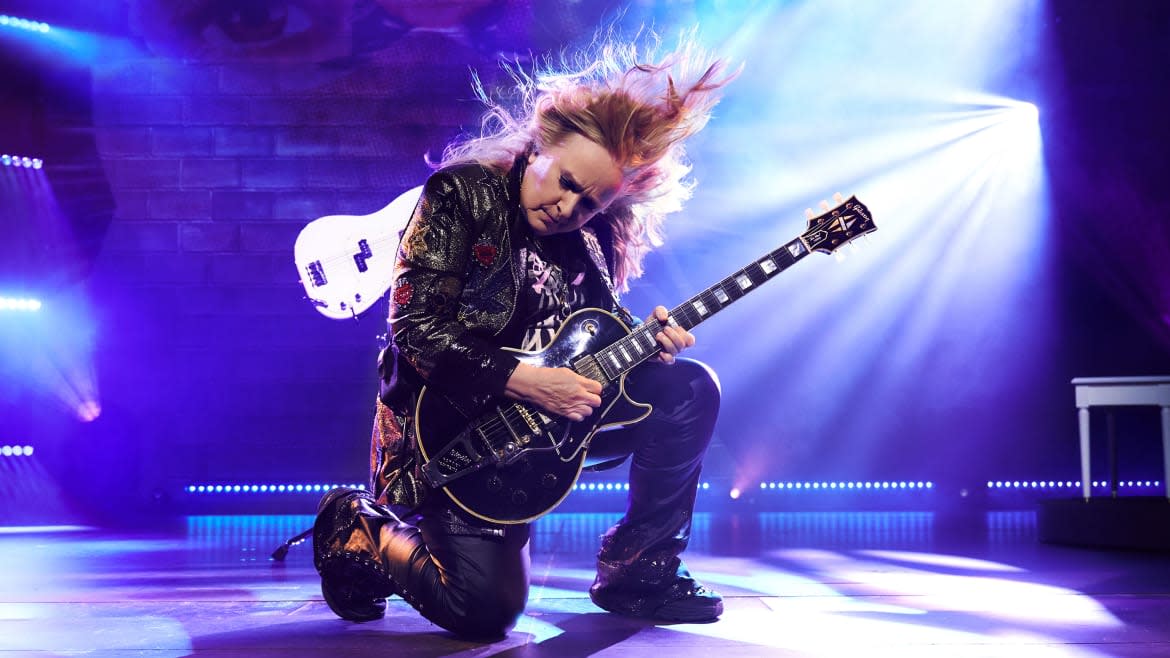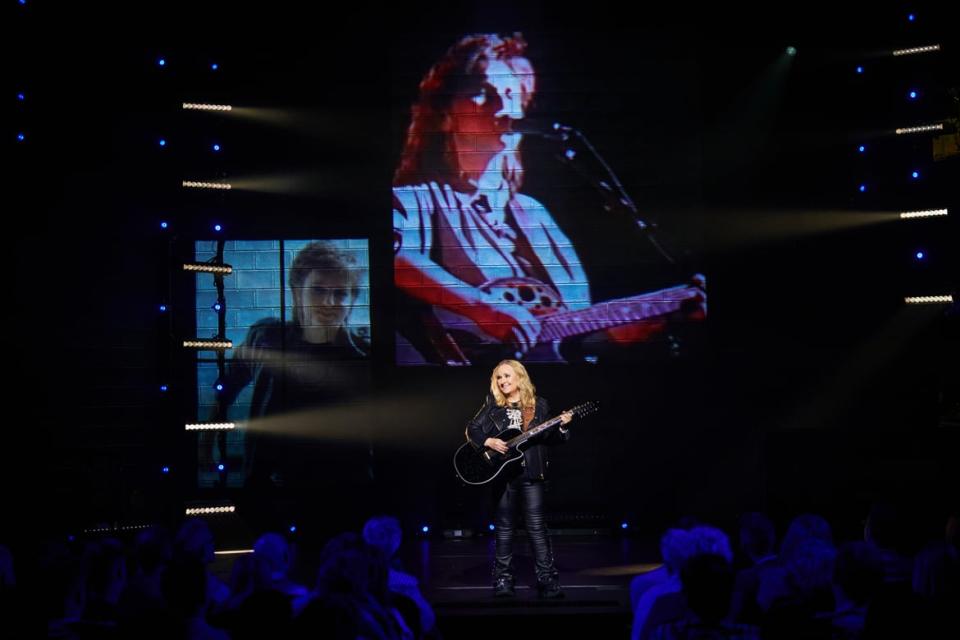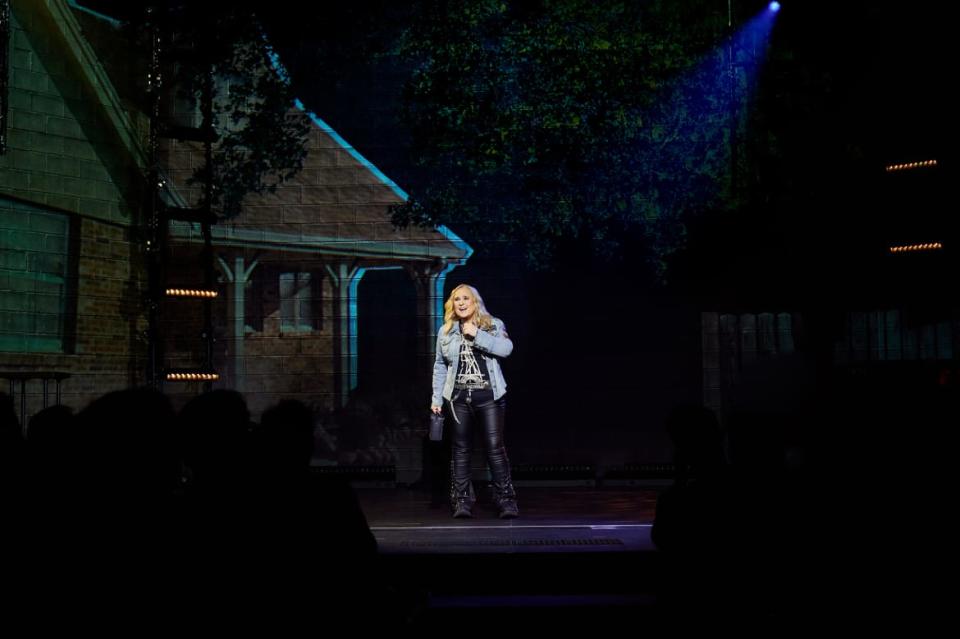Review: Melissa Etheridge’s ‘My Window’ Is a Super Broadway Concert, Not Theater

- Oops!Something went wrong.Please try again later.
As a Broadway concert, Melissa Etheridge’s My Window (Circle in the Square, booking through Nov. 19) is a stirring pleasure, from when she first emerges to belt “Like the Way I Do.” But as a piece of theater, My Window is variable—the storytelling running the gamut from compelling to lackadaisical. Etheridge’s warmth and wit are the show’s grace notes and saving graces. “I’m so dramatic,” she drawls after finishing that first song.
Severely off-putting—the Grammy and Oscar-winning Etheridge is such a consummate performer she mostly transcends it—is the terrible use of Circle in the Square. The singer-songwriter, who wrote the show with wife Linda Wallem-Etheridge (it played off-Broadway last year at New World Stages), is rightly proud to be on Broadway—and her adoring fans applaud this success when she mentions it—but the staging is a drearily unimaginative use of such a unique space for theater. For most of the show, Etheridge sings from a conventionally placed stage at the back of the venue, meaning the in-the-round audience is straining and tilting necks and bodies to see her.
Occasionally, Etheridge comes out to sing from a small plinth in the center of the venue—great, that is exactly where she should hold forth from in the venue—but all too soon she wends her way back to the faraway stage. Perhaps this odd physical positioning is because the walls behind her serve as a backdrop of projected images from her past—an affectingly curated scrapbook beginning with her childhood and running through her musical success—but it feels a waste of space, when Etheridge should, quite literally, be center stage.
She has a sparky compadre in Kate Owens, playing an unspeaking “roadie” who plays a multitude of characters and general assistant ferrying guitars and various things on and off stage. Her most hilarious moment is as a lesbian in a bar rapturously losing her mind, crawling across the floor in ecstasy over Etheridge’s voice.
My Window—titled after Etheridge’s most famous song, “Come to My Window”—is at its most engaging when Etheridge speaks about coming out in the ’90s when few stars were out. She talks about the power of doing it, and why she had to do it, and she eloquently and plainly lays out the benefits of not having to hide anything anymore, and the most beneficial thing of all: being true to oneself. It was her fourth album, after this moment, tellingly titled Yes I Am, that sold millions and crystallized her artistry for a mass audience.

Melissa Etheridge performs in 'Melissa Etheridge: My Window' on Broadway.
On stage, Etheridge possesses an innate sense of fun, misbehavior, and mischief. She is like her songs: confessional, warm, a naturally engaging raconteur. She charts the trajectory of a true rock and roll life, anecdotes interspersed with songs including “I’m the Only One,” “Come to My Window,” “Ready to Love,” “I Want to Come Over,” Open Your Mind,” and “Here Comes the Pain.”
She talks about growing up in Kansas where her first instruments were the banging of pots and pans, falling in love with music via a transistor radio and The Ed Sullivan Show, the guitar first meant for her sister that eventually made its rightful way to Etheridge. The sexism of the time means she is given a clarinet to play in the school band rather than her preferred drums, but she demolishes every obstacle presented to her.
We hear of her first love (a colonel’s daughter), then later meeting queer women for the first time in Boston, and the tentative first gigs in small venues before she finally heads west to Los Angeles and her formative residency at a lesbian bar in Long Beach, where Chris Blackwell of Island records sees her and signs her.

Melissa Etheridge performs in 'Melissa Etheridge: My Window' on Broadway.
In the show, she doesn’t name names of her past lovers—notably the former wife of the Hollywood movie star who was her first major relationship (Julie Cypher, former spouse of Lou Diamond Phillips). The women’s pool parties in Los Angeles were wild and starry affairs, and eventually inspired the shenanigans of The L Word, as Etheridge recalled in an interview with The Daily Beast, alongside the celebrities who sought her counsel in coming out after she had done it so bravely at a time when such declarations were still big, banner-headline deals.
One of the loveliest sights at the Broadway show is seeing so many queer people and queer couples looking so happy to be there. Etheridge means a lot to so many—the audience, its warm devotion, and Etheridge’s response to both, reflects that.
The show loses its focus, perhaps inevitably, when Etheridge talks (and sings with psychedelic graphics) about her advocacy of recreational drugs like cannabis, mescaline, and psilocybin (“all non-addictive healing medicines”). These sections embody the maxim that there is nothing so boring than listening to someone talk about their druggy experiences or recount their trips, good or bad—right down to talk of portals, astral cats, and searching out shamans. She takes ayahuasca. “When I returned and tried to explain that everything is love, I realized that this was something you cannot teach. It can only be learned.”
Etheridge also talks about confronting breast cancer—she is now cancer-free—but not the controversy and criticism that erupted after remarks to AARP magazine implying that genes for breast cancer could be turned on or off by diet. In the stage show, she says she was not afraid of death, seeing cancer as “a major cleansing.” She adds, “I turned to my friend, cannabis. I called my doctors and said, ‘I do not need to take this chemo any longer. My body will be better if I stop now.’”
She recalls the death in 2020 of her 21-year-old son, Beckett, following his own addiction to opiates—bravely trying to make sense of her own folds of grief and guilt. Here, the staging is suddenly stark—essentially a blackout, with Etheridge’s figure returning to us out of the inky darkness as she tries to make some kind of sense out of the awfulness. She and her wife have set up The Etheridge Foundation “that researches plant medicine as an alternative to opioids.” How she feels about drugs personally, and more generally, after such an awful tragedy goes unexplored.
Etheridge says she knows her son would want her to live, and embrace life, and this is what she has tried to do. She ends the show with “Come to My Window,” encouraging her fans to sing along. They do. It’s a crowd-pleasing end to a show that resoundingly succeeds as a concert, rather than a piece of theater. As Etheridge sings in “Here I Am Again,” music is her lifeblood—both energy and salve. “The song,” she sings, “will never end.”
Get the Daily Beast's biggest scoops and scandals delivered right to your inbox. Sign up now.
Stay informed and gain unlimited access to the Daily Beast's unmatched reporting. Subscribe now.

